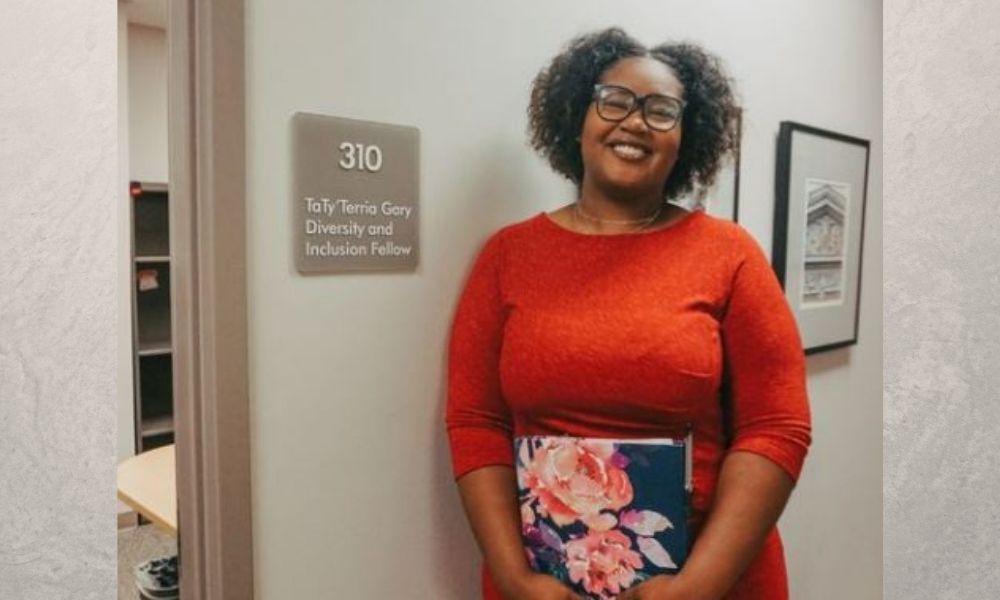As a student at Newman University, TaTy’Terria Gary ‘21 stayed busy and engaged as a member of many clubs including the Black Student Union and as a senator in the Student Government Association.
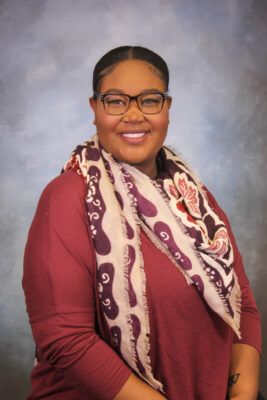
After graduating with her Bachelor of Science in biology, she didn’t see herself working 40 hours a week while attending graduate school. Then, through a friend, she heard about a local fellowship position and felt called to apply.
Now, while working on her master’s degree online, Gary is working full time as the diversity, equity and inclusion (DEI) fellow for Lead for Kansas in Wichita.
Her fellowship will end around the same time she completes her master’s degree. Until then, Gary said she’s working hard to focus on the success of both roles she plays.
Making a difference
Gary didn’t waste any time diving into her duties at Lead for Kansas when she began in August 2021. She knew she wanted to make the most of her two-year fellowship and immediately came up with a plan to organize and execute a series of lunch and learn sessions.
Lead for Kansas is a subdivision of the national program, Lead for America. Its goal is to retain local young leaders and to help build a community in which young people want to stay and thrive.
Gary’s role as DEI fellow is to encourage city employees to build on the open and inclusive community within their work environment, taking the ideas and topics discussed during her program beyond their professional lives.
“The idea of the lunch and learn program is to allow space for Sedgwick County employees to be vulnerable and to talk about all aspects of DEI,” said Gary. “To have a space to ask questions and communicate with people they work with every day about the importance of bringing your whole authentic self to work and what that means for each individual.”
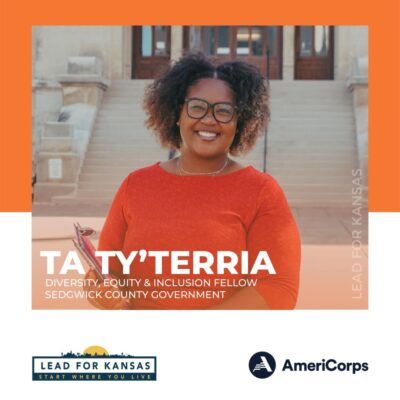
Gary hopes to lay a strong foundation during her two-year fellowship and build a game plan to implement throughout time and generations.
“Everyone has to be really committed to the process. You learn early on in DEI that you put the knowledge on the table and then let them decide their personal time frame. Sometimes the hardest part is for people to accept change. And having impactful and fruitful conversations takes everyone in the group.”
The one-hour brown-bag style sessions take place biweekly. One topic is chosen for six sessions and then a new series will begin. Gary timed the program so it would run the full course of her fellowship.
The program is paired with a consultant firm that is looking at policy change and structural foundation. The lunch and learn sessions would help fill in pieces, talking about people change, which works consecutively with policy change, Gary said.
“It’s important to realize that we as people go through things that aren’t just work-related. This idea that everyone has to drop whatever is going on at home can actually cause extra stress and doesn’t make for a sustainable happy employee, let alone a sustainable happy work environment.
“So we’re exploring the idea of getting to the point that it’s OK to be vulnerable at work — to a certain extent — and to create those bonds with your supervisor and co-workers, which can lead to a more culturally confident work environment.”
Juggling work and education
Gary is currently enrolled at Bay Path University located in Longmeadow, Massachusetts, in the genetic counseling program. She is on track to complete her master’s degree in May 2023.
She said juggling a full-time job and a graduate degree leaves her with little time to have a social life.
“I will say that I’m very fortunate to have a supervisor who gets it,” said Gary. “She’s incredible. She understands if I need to adjust my schedule to make sure my school needs are met.
“It’s so great to work under a woman in all of her glory. She’s taught me that you can be your authentic self while being in a high position and doing something really important.
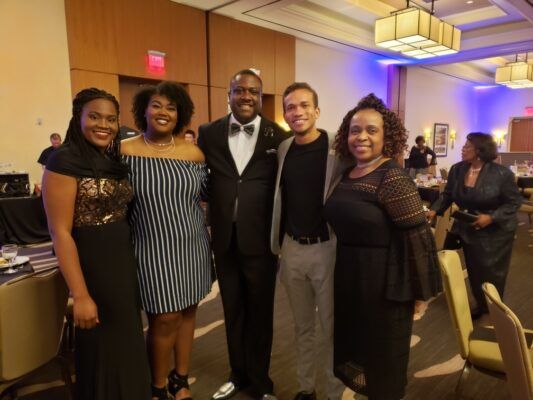
Gary said she really doesn’t mind not having much of a social life right now. She does make an effort to go out with friends and allow herself some downtime, but mostly, she said, her days and evenings are so full and she’s just too tired to go out.
Time management and self-care is important to Gary. And she enjoys learning from others’ life experiences to help her along the way.
“I really try to stay diligent and organized in my schedule,” she explained. “It’s nice to go to school with classmates who aren’t really in the same situation as me because I’ve picked up different tips and tricks. There are so many different people who can lend a hand or just give guidance. It’s an intimate class size — 18 students — all dealing with life at different levels and stages.”
Future plans
Gary plans on working in the genetic counseling field for a few years to gain some real-world experience. But her ultimate goal is to open and run her own birthing center.
One of her favorite realizations is that social and natural science can work together. Gary sought out a career field that personally represented that, which is why she chose genetic counseling.
“The birthing center for me is putting both those passions together. I’m passionate about women’s health, especially in pregnancy.”
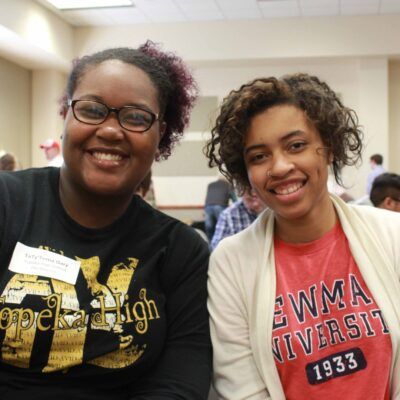
Gary wants to teach mothers about birthing options outside a traditional hospital setting, adding that having a doula or midwife can give women the comfort of knowing they aren’t alone if they do not want a traditional setting.
“I want to provide education for minority women — really all women in general — but especially minority women, because they struggle in the education of knowing themselves. Many people don’t know how their body changes each year.”
Gary said genetic counseling plays into a birthing center in the form of prenatal genetic counseling.
She sees educational classes playing a large role in the day-to-day process of her birthing center. Gary believes there is room for improvement when it comes to educating women.
“Some generations don’t grow up getting the birds and bees talk, or knowing your body and how that can relate to some genetic disorders. There are so many risk factors and not knowing those things puts us at risk for being as healthy as we could be.”
Advice for future generations
At Newman, Gary said she learned some of her best lessons and some of her toughest lessons.
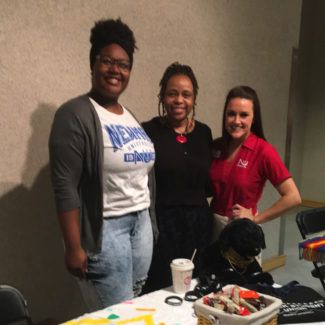
She was encouraged by her professors and forged relationships that will sustain her for the rest of her life, she said. But something that stood out to her when researching Newman was their sponsors — the Adorers of the Blood of Christ (ASC).
“That was the best thing — when I found out there would be actual nuns on campus and I would have classes with them. It was so amazing and fun. It was nice to have that idea of worship mixed with my education.”
She was also highly encouraged by one of her professors, Alan Oberly, who said science does not contradict religion. This was huge for Gary, helping her to realize that they are really answering two different questions and working together simultaneously. This realization helped reinforce that she could do and have both.
Gary’s advice for current students is to build close relationships with ASC members and work to understand the importance of being a servant leader.
“Working really closely with the ASC helped me understand the importance of servant leadership and its connection to building a better world.”
Gary added, “Being in a nonprofit situation might make some uncomfortable, but it puts you in a position to see how other people are dealing with life. It’s so important to experience that. I wasn’t planning on doing Lead For America. But it’s been such an amazing and humbling experience. I’m learning so many things that I wouldn’t have if I didn’t get into this role.”
Apply to Newman University
Newman University is a Catholic university named for St. John Henry Newman and founded by the Adorers of the Blood of Christ for the purpose of empowering graduates to transform society. Apply today and earn your degree of difference!
